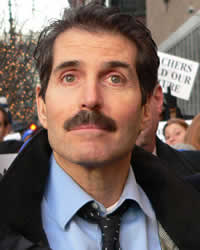
UPDATE added below: Stossel responds.
All journalists make mistakes. After all, it's a human enterprise. Then there's John Stossel, now of Fox News.
He doesn't merely commit the occasional error, he combines tall tales and worthless stats to fit his conservative rant-of-the-day.
A recent piece on the Fox Business website is a perfect example of his shamelessness. His topic was how regulations hurt cities, and he spent quite a bit of time on poor Cleveland, Ohio, named by Forbes magazine in February as the most miserable city in America.
Cleveland can speak for itself; I'm calling out Stossel. In his litany of reasons why the town totally blows, he writes the following:
"Cleveland prefers state capitalism. It owns and operates a big grocery store, the West Side Market. Typical of government, it's open only four days a week, and two of those days it closes at 4 p.m."
Give me a break, as Stossel says. The West Side Market isn't a "grocery store" at all. It's a farmer's market, and the city is the landlord, leasing the building to a hundred vendors who sell fresh vegetables, meats, flowers. It's only open four days a week -- in the daytime -- because it's a real market, not because that's "typical of government."
A century-old institution with a clock tower, the Market is beloved by locals and tourists, attracting over a million visitors a year. According to its website, the land was gifted for such a purpose by long ago civic leaders. Besides, many cities and towns have farmer's markets, or a fisherman's wharf. They're a nice urban amenity, bustling with street-level capitalism.
Stossel doesn't reveal any of that. His entire characterization is blatant b.s. It's a bold, fresh piece of deceit worthy of his Fox News colleagues.
Another example: In attempting to make the case against publicly financed sports stadiums (and there is a case, but he doesn't make it), he notes there are only 41 home basketball games a year, then immediately asks, "How does that sustain a neighborhood economy?" Interesting juxtaposition of statistic to question.
He's trying to plant the specious notion that the House of LeBron is somehow locked and shuttered for 324 days a year. If true, it certainly wouldn't help sustain an economy. Well...it isn't true.
Like all NBA facilities, Quicken Loans Arena in Cleveland operates year-round, hosting everything from rock and country to the family-friendly "Stars On Ice." Two million people pass through its doors annually.
On the other hand, Stossel touts Houston, Texas, with its lack of zoning laws, as an example of how cities should conduct business. Naturally, he fails to mention that its professional football, basketball and baseball teams play in shiny stadiums partially funded and built with tax dollars.
In a final example of piling on, he notes that "Half of Cleveland's population has left since 1950." Does he really think that's because of over-regulation by City Hall?
The post-World War II migration from the rust belt to the sun belt involved many factors, not the least of which were a desire for work and the creation of the interstate highway system under Eisenhower. When once-grand U.S. industries like steel rolled over and died, job seekers and college grads went elsewhere.
Municipal red tape, Stossel's villain, can't be blamed for this historic exodus. It happened throughout the Northeast and Midwest, from Buffalo to Philly to St. Louis.
"White flight" to the suburbs had an impact, too, yet our intrepid ideologue also leaves that out. As Cleveland-proper shrank by 164,000 between 1950 and 1970, the surrounding Cuyahoga County area actually grew by 300,000.
Migration continues today. According to a March 31 report in Manufacturing & Technology News, "Dozens of cities throughout the industrial Great Lakes states and Midwest have lost half of their populations over the course of one generation."
Stossel's shopworn technique, honed for years on ABC's 20/20, is to marshal his porous arguments in two ways. He leaves out crucial information, and uses facts that aren't particularly germane, all the while betting that viewers won't know any better. Maybe he doesn't, either. Who knows?
If a Huffington Post contributor employed Stossel's deceptions and omissions with such regularity, we'd be thrown in the blogger's brig.
On Fox News, of course, it's called "fair and balanced."
UPDATE (April 17): Stossel has publicly responded to this HuffPost on his Fox Business blog. In his rebuttal, he backs off of his initial insinuation that Cleveland's pro basketball arena is in use for only 41 days a year. He now admits, grudgingly, that the correct figure is more like 200 days. That's quite different. This means the place is booked more than every other day of the year, whatever the market will bear, yet Stossel still manages to complain about the 165 down days. Other mistakes in his non-mea culpa are detailed by his own commenters.
On the issue of the West Side Market, which Stossel had falsely painted as some sort of Safeway or Kroger's, he now writes that it isn't a farmer's market because "farmer's markets typically consist of, well, farmers." His suggestion seems to be that if the person manning the booth isn't straight from central casting, wearing overalls with hay stuck in their mouth, it isn't a real farmer's market. In truth, many farmers/growers contract with vendors and produce dealers to move their goods at urban farmer's markets around the country. The fact that mom and pop are not always selling the tomatoes in person doesn't negate the concept.
